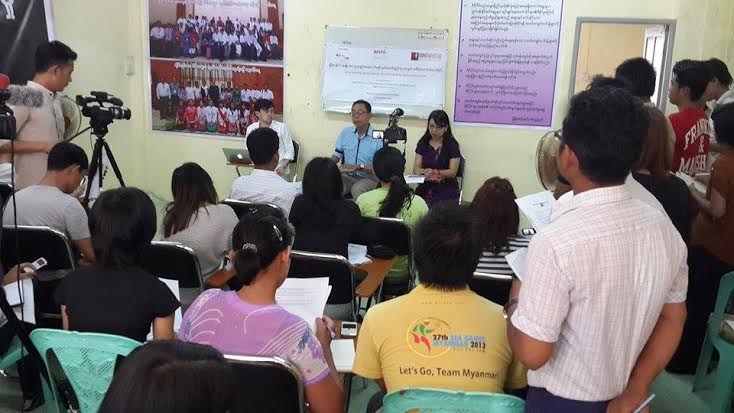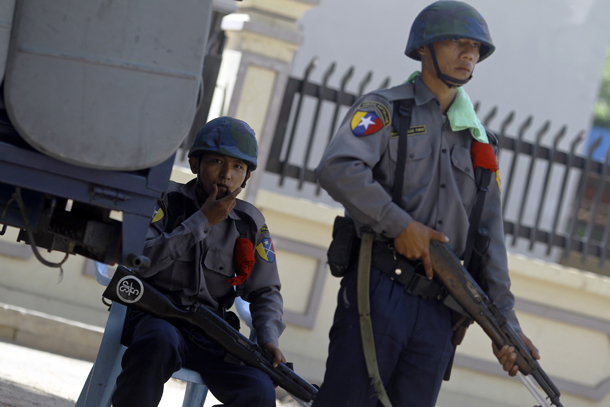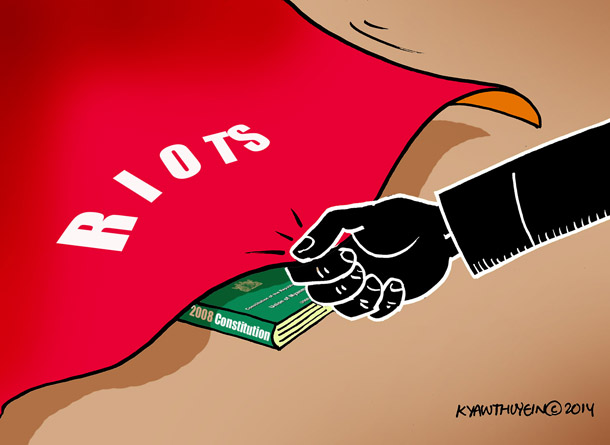124 search results found for "same impunity"
The Myanmar National Human Rights Commission Continues Failing to Deliver
 A report authored by Burma Partnership and Equality Myanmar was launched on 25 September 2014 in Rangoon revealing the continuing ineffectiveness of the Myanmar National Human Rights Commission (MNHRC) as well as the lack of independence from the government. The report was launched on the same day that a reshuffle of the members of MNHRC was announced by the government, which came as a complete surprise to civil society organizations due to the lack of consultation.
A report authored by Burma Partnership and Equality Myanmar was launched on 25 September 2014 in Rangoon revealing the continuing ineffectiveness of the Myanmar National Human Rights Commission (MNHRC) as well as the lack of independence from the government. The report was launched on the same day that a reshuffle of the members of MNHRC was announced by the government, which came as a complete surprise to civil society organizations due to the lack of consultation.
Released at the Myanmar Journalists Network in Rangoon, Burma: All the President’s Men, contributed to the annual Asian NGO Network on National Human Rights Institutions (ANNI) Report on the Performance and Establishment of National Human Rights Institutions in Asia (2014). The report analyzes the Myanmar National Human Rights Commission Law 2014 enacted in March this year (enabling law) that institutionalizes the mandate of the MNHRC. The report finds that the law does not guarantee independence from the government and in particular, the president’s office. In contravention of international standards on national human rights institutions, namely the Paris Principles, the selection process does not adequately consult with civil society. As the report points out, “It is up to the selection board to come up with procedures for short-listing candidates, yet the enabling law itself should set out the process/procedure for selection, with consultations with civil society.” The members of the MNHRC are actually chosen by a selection board of ten, five of which are from the government or are government-affiliated. The enabling law states that two members of this board are to come from civil society organizations and a further two are to be MP, yet there is no transparency regarding the procedures under which the two MPs are chosen. Additionally, the chosen civil society members to the selection board are restricted to registered civil society only, thus excluding many outspoken and critical political and human rights groups who feel they cannot register under the current climate […]
| |22 – 28 September: The Myanmar National Human Rights Commission Continues Failing to Deliver
The full text of this week’s issue of Weekly Highlights, including an analysis of current events and news highlights from inside Burma, the region and internationally, as well opinion pieces, actions, statements, press releases and reports from Burma groups and relevant actors.
|Reform of the Police and the Judiciary is a Matter of Urgency
 Over recent weeks, there has been a spate of unprovoked attacks by the Burma Police Force on peaceful, innocent civilians. On 14 August, nearly 50 police personnel in Mandalay Region shot at a group of around 200 farmers from Nyaung Wine Village, Singu Township. According to the Asian Human Rights Commission (AHRC), a 30-year-old mother of two, Ma San Kyin Nu, is allegedly one of the victims, and has been admitted to Mandalay General Hospital for urgent medical treatment as a result of her injuries. The farmers were protesting against the fact that over 6,000 acres of their land was confiscated in 1991 by the 121 Logistic Battalion of the Burma Army – without any compensation being provided – by continuing to plough their fields.
Over recent weeks, there has been a spate of unprovoked attacks by the Burma Police Force on peaceful, innocent civilians. On 14 August, nearly 50 police personnel in Mandalay Region shot at a group of around 200 farmers from Nyaung Wine Village, Singu Township. According to the Asian Human Rights Commission (AHRC), a 30-year-old mother of two, Ma San Kyin Nu, is allegedly one of the victims, and has been admitted to Mandalay General Hospital for urgent medical treatment as a result of her injuries. The farmers were protesting against the fact that over 6,000 acres of their land was confiscated in 1991 by the 121 Logistic Battalion of the Burma Army – without any compensation being provided – by continuing to plough their fields.
After the police violence, the protesting farmers prevented police from making any arrests; however, later, another 100 police arrived and blockaded the entire village. Local residents then took matters into their own hands and briefly detained about 40 police officers, angered at the brutal approach of the police to the land conflict. Although the policemen were eventually released after negotiations, the dangers and risks of uncontrolled police violence and impunity are evident: blood has been shed and anarchy has prevailed. Even if police allegations that the protestors were armed with slingshots is true, under no circumstances is the use of live ammunition by police or other state security forces on civilian protestors proportionate or justified.
Furthermore, on 14 May, All Burma Federation of Students Union (ABFSU) member Kaung Htet Kyaw was beaten by police during a suppression of a farmers’ protest in Thegon Township in Pegu Region. Kaung Htet Kyaw sustained severe head injuries. ABFSU responded by releasing a statement denouncing police mistreatment [..]
| |11 August – 17 August: Reform of the Police and the Judiciary is a Matter of Urgency
The full text of this week’s issue of Weekly Highlights, including an analysis of current events and news highlights from inside Burma, the region and internationally, as well opinion pieces, actions, statements, press releases and reports from Burma groups and relevant actors.
|14 July – 20 July: Flurry of Rumor and Counter Rumor Regarding Repatriation is Detrimental to Refugees
The full text of this week’s issue of Weekly Highlights, including an analysis of current events and news highlights from inside Burma, the region and internationally, as well opinion pieces, actions, statements, press releases and reports from Burma groups and relevant actors.
|Burma Must Find a Path to a More Tolerant Society
 The streets of Mandalay, which just recently drew over 20,000 people in support of National League for Democracy and 88 Generation Peace and Open Society’s joint campaign to amend Section 436 of the Constitution in support of democratic reform, remain deserted this last week as many business owners closed their shutters in fear, following serious unrest in the city. In the second largest city in Burma, violent mobs took over the streets, leaving two people dead and dozens injured. Some stated that over “70 police were here but did nothing,” as Buddhist mobs torched a school in a Muslim area. Ironically the international community has mostly stayed silent in the wake of the recent events when their actions are needed to protect the people of Burma, especially the most vulnerable communities, more than ever.
The streets of Mandalay, which just recently drew over 20,000 people in support of National League for Democracy and 88 Generation Peace and Open Society’s joint campaign to amend Section 436 of the Constitution in support of democratic reform, remain deserted this last week as many business owners closed their shutters in fear, following serious unrest in the city. In the second largest city in Burma, violent mobs took over the streets, leaving two people dead and dozens injured. Some stated that over “70 police were here but did nothing,” as Buddhist mobs torched a school in a Muslim area. Ironically the international community has mostly stayed silent in the wake of the recent events when their actions are needed to protect the people of Burma, especially the most vulnerable communities, more than ever.
The series of events began on 1 July, just hours after the extremist Buddhist monk, and leader of the anti-Muslim 969 movement, Wirathu, picked up a questionable post from the social media site Facebook that highlighted an alleged rape of a Buddhist woman committed by two Muslim brothers. According to David Mathieson, a senior researcher for Human Rights Watch, Wirathu, who is based in Mandalay, appeared to have played “a pivotal role” in inciting the unrest, fanning tensions by spreading accusations with religious inferences, while calling for action against the two Muslim brothers who own a teashop in the same area where his monastery is located […]
| |30 June – 6 July: Burma Must Find a Path to a More Tolerant Society
The full text of this week’s issue of Weekly Highlights, including an analysis of current events and news highlights from inside Burma, the region and internationally, as well opinion pieces, actions, statements, press releases and reports from Burma groups and relevant actors.
|Statement on Anti Muslims Violence in Mandalay
Burmese Muslims Association strongly condemns anti-Muslim violence that has erupted in recent days in Mandalay, the second largest city in Burma. The violence that has occurred is not simply a result of sectarian conflicts. It is without doubt a well-planned operation, carried out by a group of well-trained thugs–which has tacit impunity and free license from the Thein Sein’s government–not only to cause a great deal of physical harm and injury against Muslims, a helpless minority group in Burma, but also to instil immense psychological terror and mental anguish, during the Muslim holy month of Ramadan […]
| |ASEAN Community will Be a Failure without Regional Rights Protections: ASEAN MPs Call for Independence and Strengthened Mandate for Regional Human Rights Commission
BANGKOK — The ASEAN Intergovernmental Commission on Human Rights (AICHR) has failed to bring any discernible improvement to or provide any protection for the basic rights of the people of Southeast Asia since its inception in 2009 and must be radically changed in ways that strengthen its independence and mandate if the ASEAN Community is to have any real meaning or impact, Southeast Asian lawmakers said today […]
| |WLB Welcomes UN Recognition of Burmese Government Failure to Address Ongoing Sexual Violence
The Women’s League of Burma welcomes a new report by United Nations Secretary-General Ban Ki- moon that calls for Burma’s government to investigate crimes of sexual violence, and highlights the need for constitutional reform to bring the military in Burma under civilian oversight […]
| |








 All posts
All posts